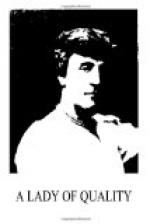done before her widowhood, and Anne knew whence this
custom came. There were times when, by use of
her presence, she could avoid those she wished to thrust
aside, and Anne noted, with a cold sinking of the
spirit, that the one she would plan to elude most
frequently was Sir John Oxon; and this was not done
easily. The young man’s gay lightness of
demeanour had changed. The few years that had
passed since he had come to pay his courts to the young
beauty in male attire, had brought experiences to him
which had been bitter enough. He had squandered
his fortune, and failed to reinstate himself by marriage;
his dissipations had told upon him, and he had lost
his spirit and good-humour; his mocking wit had gained
a bitterness; his gallantry had no longer the gaiety
of youth. And the woman he had loved for an
hour with youthful passion, and had dared to dream
of casting aside in boyish insolence, had risen like
a phoenix, and soared high and triumphant to the very
sun itself. “He was ever base,” Clorinda
had said. “As he was at first he is now,”
and in the saying there was truth. If she had
been helpless and heartbroken, and had pined for him,
he would have treated her as a victim, and disdained
her humiliation and grief; magnificent, powerful,
rich, in fullest beauty, and disdaining himself, she
filled him with a mad passion of love which was strangely
mixed with hatred and cruelty. To see her surrounded
by her worshippers, courted by the Court itself, all
eyes drawn towards her as she moved, all hearts laid
at her feet, was torture to him. In such cases
as his and hers, it was the woman who should sue for
love’s return, and watch the averted face, longing
for the moment when it would deign to turn and she
could catch the cold eye and plead piteously with
her own. This he had seen; this, men like himself,
but older, had taught him with vicious art; but here
was a woman who had scorned him at the hour which should
have been the moment of his greatest powerfulness,
who had mocked at and lashed him in the face with
the high derision of a creature above law, and who
never for one instant had bent her neck to the yoke
which women must bear. She had laughed it to
scorn—and him—and all things—and
gone on her way, crowned with her scarlet roses, to
wealth, and rank, and power, and adulation; while
he—the man, whose right it was to be transgressor—had
fallen upon hard fortune, and was losing step by step
all she had won. In his way he loved her madly—as
he had loved her before, and as he would have loved
any woman who embodied triumph and beauty; and burning
with desire for both, and with jealous rage of all,
he swore he would not be outdone, befooled, cast aside,
and trampled on.




